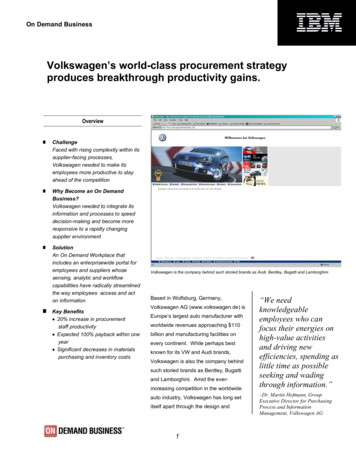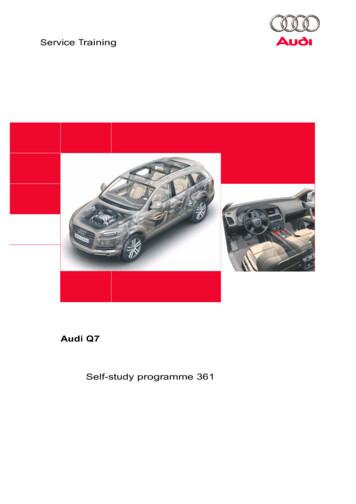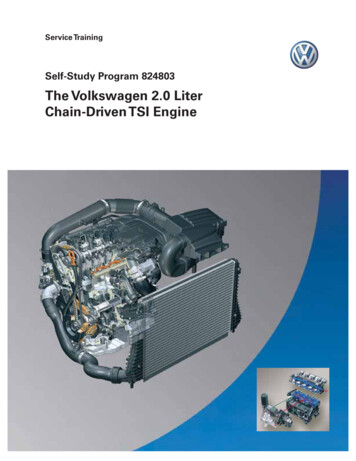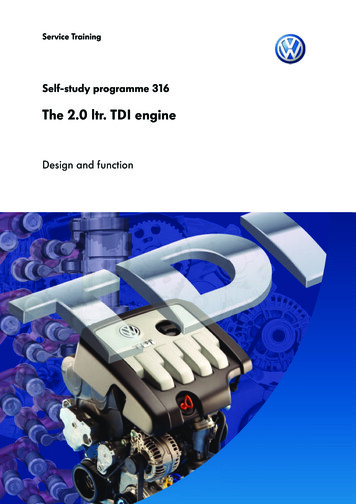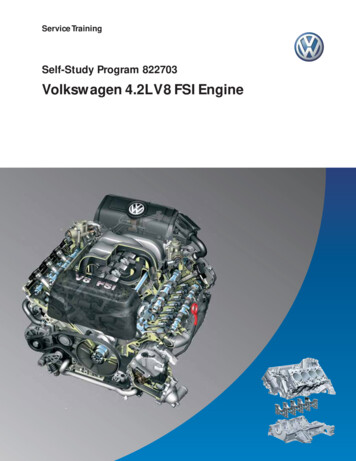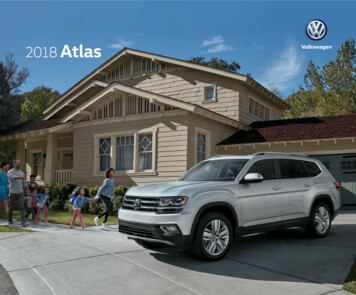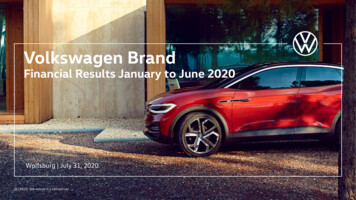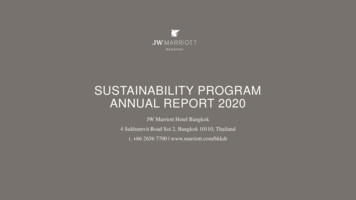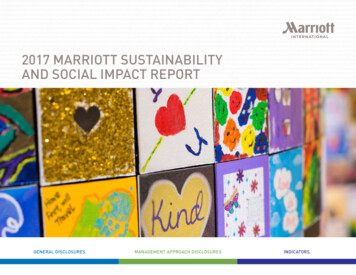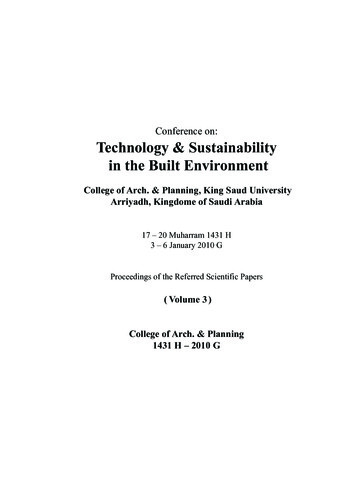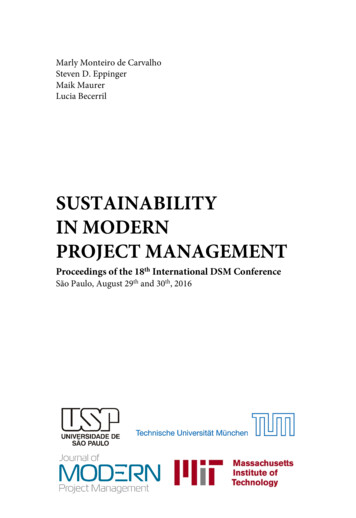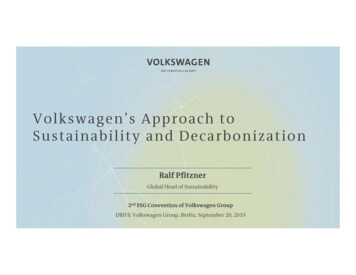
Transcription
Volkswagen’s Approach toSustainability and DecarbonizationRalf PfitznerGlobal Head of Sustainability2nd ESG Convention of Volkswagen GroupDRIVE Volkswagen Group, Berlin, September 20, 20191
ChargingInfrastructureRisk managementRankings & Sustainability Reporting/nonfinancial reportTransforming the workforceMOIANew MobilityServicesCorporate CitizenshipSustainabilityGoToZeroComplianceHuman RightsSupplierS‐RatingUrban MobilityStakeholder EngagementZero ImpactFactorySustainability CouncilCarbon PricingCircular EconomySustainability communicationIntegrity UN‐Sustainable Development Goals (SDG) CO2‐compensationESG‐InvestorsImpact AssessmentEmployee engagementSustainability @ Volkswagen covers a broad range of topics - Decarbonization, Integrity,Sustainable Supply Chains, Transforming the Workforce are among most material ones
Transport Sector accounts for 14% of global GHG EmissionsIn the EU, transport is the only sector with emissions increase since 1990Global GHG-Emissions by sectorTrends in EU by sector since 1990 [MT of CO2e]BuildingsOther energy6%Industry10%2.00025%Energy supplyWasteTransportInternational aviationResidential/commercialInternational .00014%24%Agriculture, Forestry; Land useSource: IPCC 2014, EEA 2018Transport5000199019952000200520102015
Volkswagen will be part of the solution, our focus is on climate change mitigationand decarbonisationDIMENSIONS OF SUSTAINABILITY AT VOLKSWAGENProfit: Strategy &ManagementWhy it matters to Volkswagen:SUSTAINABILITYVOLKSWAGENGROUPPlanet / Environment:Products, Services &ProductionPeople &ResponsibilityFOCUS AREA: DECARBONIZATION / CLIMATE CHANGEMITIGATION Because of our significant influence andcommitment to responsible action (1% ofglobal CO2- emissions affected by ourpassenger car portfolio) Because of rising stakeholder expectations Because decarbonization delivers directbusiness value
E-mobility is the only way forward to achieve climate targetsrather later20352040rather earlier2045 10-15%10-20%10-25%10-20% 60%10-25%BEV Our Target:CO2 neutral fleet by 2050 70%FCEV 85%PHEV (eFuels)conventional ICE Increase share of future technologies – Focus E-Mobility Implementation of further measures to become CO2 neutral
A group wide target of 30% CO2e reduction/vehicle over lifecycle for VolkswagenGroup was decided - in line with the Paris AgreementPassenger cars3)VOLKSWAGEN GROUP BASELINE 2015: Ø CO2e-EMISSIONS/VEH. (LIFECYCLE)[DKI, t CO2e/veh.]1)PRODUCTIONSupply ChainUSEIn-houseFuel SupplyGROUP TARGET 2025/VEH. (LIFECYCLE)RECYCLING &OTHER[DKI, t CO2e/veh.]1) 67%67%67%13%13%5.55.713%0.92%13%13%13%2%2 Ctarget2%2015(Baseline)2015 Baseline VW Group1) Decarbonization index (DKI), 2) target derived based on method by Science Based Target according to 2 C target, 3) Passenger cars including light duty vehicles,Target2025
E-mobility transformation is reflected in our corporate planningPARIS IMPLICATIONS AND TRANSFORMATION PATHConventional platformsSOPSOPConventional projectsEOP 10 yearsFleet renewal„Zero Emission“in the existing fleetBroad product portfolioTransformationCO2 neutral carsCO2-EmissionsNew business model BEV20202050
CompensateConvertReduceGroup decarbonisation target[t CO2eq/veh.]The decarbonisation target will be achieved via three pillars:1. Reduce CO2; 2. Convert fossil to renewable energy; 3. Compensate the rest1Effective and sustainable CO2 reduction2Switch to renewable energy sources for power supply3Compensate remaining emissions that cannot be avoided
To reach our decarbonisation target measures along the entire value chain arerequired
Primary energy demand is lowest with BEVsPRIMARY ENERGY REQUIREMENT IN WH/KM FOR LIFECYCLE#11.5001.000500Diesel1)Gasoline1)Full ll Hybrid(eFuel, Gasoline)Fuel Cell(eH2)Plug-In Hybrid Battery (BEV)(eFuel, Gasoline)RegenerativeTHE MODEL OF THE ENERGY BALANCE LIFECYCLEVehicle developmentVehicle productionFuel productionExample: A-Segment 200.000 km, CO2 emissions & energy over lifecycle of vehicle and fuel1) notfully comparable with energetic base, not CO2 neutralFuel consumptionRecycling
ID.3 as first showcase for decarbonization along the value chainObjectivezero-emission-CO2-neutral productionvehiclesincl. supply chainVW supplypromiseBVision:100 %CO2-neutrale-mobilityCO2-neutral hand-overto customer in retailCustomerofferingA100 % green powerin high-power chargingnetwork EUElli Green power contractsfor home-chargingCustomerOffers for CO2-freeuse phase
BEV today already first choice in CO2 over lifetime – example current Golf class car020406080100120140160180g CO2eq/kmPetrolDieselCNGPHEV(EU 28 Mix, Petrol)BEV(EU 28 mix)production (cradle2gate)Source: Volkswagen K-GEGU 2019, “Klimabilanz Antriebe”; Compact Car (Golf-class),LCA, use phase acc. to WLTP, 200.000 km lifeFuel Supply (well2tank)use (tank2wheel)
Customers and markets must still be prepared for e-mobilityVision ofCO2 neutral mobilityPortfolio transformationat all brandsCustomers & MarketsCustomersCustomer readinessPublic awareness201720252030Positive image&Commitment to the goals ofMarketsthe Paris Climate AgreementCO2 neutral existingfleet in 2050Supportive regulationsFinancial incentives13x4x1xSufficient ChargingInfrastructure
Decarbonization: We address an entire ecosystem and go beyond the vehicle itselfSupporting theEnergy transition Lower emission productsConversion of Wolfsburg power plant, saving 1,5 mn tons of CO2 by 2022, corresponding toemissions of 870,000 cars per yearVolkswagen with 37% renewableenergy in manufacturing (as of2017)Further emission reductionsAlternative fuels (e.g. Audi egas)Extended portfolio ofelectric vehiclesCharging infrastructure Joint venture forrapid chargingnetwork in placeELLI, offering homecharging with greenelectricityElectrify AmericaLidl & TescocooperationMobility Services MOIA electric shuttles in firstcitiesAll-electric car-sharingVolkswagen We shareQ2/2019 in Berlin
Supply Chain Sustainability – managing risks along three defined priority areasRaw materialLong- n electricity in HV-battery cell productionVehiclesID.3Closed loopLong- termgoalsLong- termgoalsComponentCommitment to 2 C es for all high-risk raw materialsIdentification of smelters(high-risk materials)Raw Materials ObservatoryHackathonSustainability RatingSupplier assessmentsSupplier auditsSupplier events worldwide
Improve basic principles and success factors for supply chain management Transparency within sub-supply chainspilot projects with IBM & Minespider Transparency on sustainability performance of suppliersIntroduction of S-Rating Harmonisation of standards and toolsPilot on audit standards for direct suppliersand mining companies, uniform CO2 data Cross-industry initiativesand cooperationsEngagement in initiatives like DRIVESustainability, Responsible MineralsInitiative or Global Battery Alliancen-tier・・
Sustainability in the Supply Chain: We want to be a Driving TIVEDRIVESUSTAINABILITYSettingstandards toensure the social andenvironmentalsustainability forbattery materials.Develop andstandardizecertification systemsfor cobalt, tantalum,tungsten, tin & gold.Develop andstandardize riskassessment tools(questionnaires, rawmat. observatory).Offering trainingmaterials forupstream actors inthe supply chain.Develop and conducttrainings andeducational products/ tools.ALUMINIUMSTEWARDSHIPINITATIVEWe engageactively ininitiatives in orderto trigger broadsupply chainimprovementsdevelop &introduce toolsand standardsdo joint riskassessmentsdesign & conducttrainingsPlatform forexchange andon-the ground work.Globalsustainabilitystandard foraluminum.Apply to all stages ofthe aluminum valuechain from rawmaterial extractionto recycling.
We are strengthening external stakeholder relations. Group Strategy’s stakeholderdialogue series provides a holistic format for discussions with key opinion leaders
Sustainability Council as critical advisor to the Group Board of ManagementTopics Sustainable Mobility andEnvironmental Protection Social Responsibility and Integrity Future of Work and DigitalizationTasks Strategic Counseling of the BoM Strengthening SustainabilityManagement Bridge to Stakeholders Expertise and InitiativesProjects Transformation Towards SustainableTransport Systems – Next GenerationPolicies Open Source Lab for Sustainable Mobility Forecast-based Financing – CombatClimate Change Impacts in Asia-Pacific
We have a strong sustainability network – Sustainability as part of Group Strategysince 2018
Communication on Sustainability:Sustainability Report and Sustainability Magazine ShiftSustainability ReportShift MagazineIncludes the combinedseparate non-financialreport and fulfils therequirements of the HGB(German CommercialCode) and the GermanCSR DirectiveImplementation Act.How can Volkswagen –after the Diesel Crisis talk about sustainabilityagain without fear ofridicule?GRI Standards(comprehensive level)Shift, whichcomplements ourtraditional SustainabilityReport, is an initialanswer.FOCUS: ESG, facts, figures, regulation, GRI / UN SDGs1FOCUS: conflicting goals, change /crisis, sustainability/shift.html1) GRI Global Reporting Initiative SDG Sustainable Development Goals
SummaryDecarbonisation is our key sustainability priority @Volkswagen GroupOur ambitious decarbonisation program covers the entire life cycle.Clear priorities are set: avoid & reduce CO2-emissions, compensate nonavoidable emissionsSupply chain Sustainability is essential for a resilient supply chain and ourreputationStakeholder Engagement is important in our industry’s transformationSustainability reporting and communication: Ensuring transparency to stakeholders
Sep 20, 2019 · Source: Volkswagen K-GEGU 2019, “Klimabil anz Antriebe”; Compact Car (Golf-class), LCA, use phase acc. to
